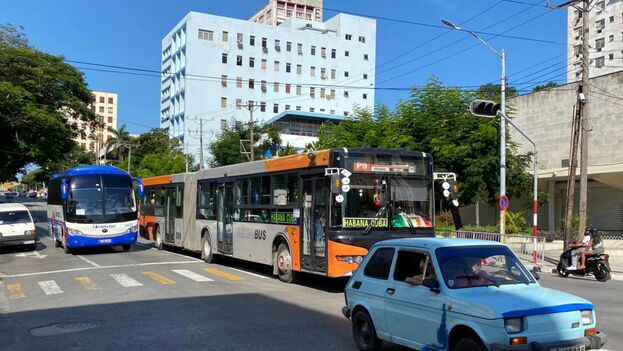
![]() 14ymedio, Luz Escobar / Juan Diego Rodríguez, Havana, 4 July 2020 — “It seems like a lie to me, I hadn’t waited even five minutes at the bus stop and the bus arrived and best of all, it was practically empty.” In front of the Bus Terminal, Rocío shared her joy when she boarded the P12 route this Friday, the first day of the implementation of Post-Covid Phase 1 in Havana.
14ymedio, Luz Escobar / Juan Diego Rodríguez, Havana, 4 July 2020 — “It seems like a lie to me, I hadn’t waited even five minutes at the bus stop and the bus arrived and best of all, it was practically empty.” In front of the Bus Terminal, Rocío shared her joy when she boarded the P12 route this Friday, the first day of the implementation of Post-Covid Phase 1 in Havana.
She sits next to a friend who is with her, takes out her cell phone, stretches out her hand and they take a selfie: “So they won’t tell me later that I made it up.”
Public transport is beginning to circulate after months of being shut down by measures against the Covid-19 pandemic. Before the passengers, all wearing a mask, who are waiting at the stop can get on, an inspector from the Ministry of Transport walks the inside of the from end to end, makes a count, points to a checklist and determines that only 12 people can ride.
At the door, the driver’s assistant drops a few drops of chlorinated water into each passenger’s hands as he collects the fare.
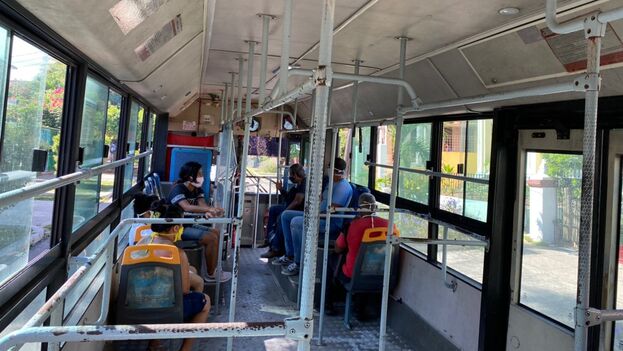
On some of the main arteries of the capital, such as 23rd Street, Carlos III or Boyeros, traffic is livelier this Friday, although still scarce. As reported by the official press, 109 bus routes are in service, in addition to the ferry services for the crossing of the bay, the bike-bus for the tunnel, and the road taxi service provided by the minibuses, known as gazelles. The measure to restart transport was one of the most anticipated, especially to regain mobility between municipalities.
“For months I have had to walk from El Vedado to Playa to visit my sister and look at me now, I am alone in this gazelle,” says a lady before getting into a road taxi at the corner of Linea and L.
Similarly, as the city entered this first phase of reopening, some markets have opened their doors. At the Agua y Jabón (Water and Soap) store on Obispo Street in Old Havana, several customers lined up eager to learn what was for sale.
“I’m waiting to see what’s there, because for weeks I haven’t gotten detergent, soap, or shampoo,” says a lady who has just joined the long line waiting in the sun. “I hope at least that’s what they put out.” The lines are more overflowing than ever. Throughout Obispo Street, the morning rush of employees in many markets is focused on rearranging merchandise and cleaning windows and floors.
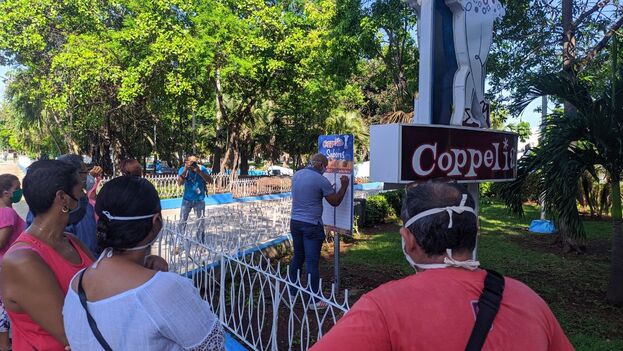
Other points of the city have also recovered their routine, such as the Coppelia ice cream parlor. “Look at me, look at me, I entered without waiting a single minute in line,” says Darío, a teenager who almost jogs over to one of the courts on the ground floor. On the menu board that announces Coppelia’s flavors there is only one: orange-pineapple.
The handicrafts fair on La Rampa also opened initially this Friday, but later, the police forced them to close the stalls on the grounds that the first phase of reopening does not include sales in privately-run spaces located in squares and parks, in order to avoid crowds.
Before that happened, an artisan was pushing his cart with a friend, and after arranging the merchandise at his stall, he couldn’t help but share his joy. “I was going crazy waiting to bring my table here, from home I hardly sold anything; it is not the same: what is not exhibited is not sold,” he explained. “Right now there is little tourism, so I have loaded up with the products that sell more to Cubans: dresses, wallets, jewelry and shoes.”
“Find me some flip flops to walk around the house and some sandals,” asks Darío’s first customer. “Mine are broken and I couldn’t buy new ones.” But the enthusiasm was short-lived and an hour later the merchant had to collect all the products and leave.
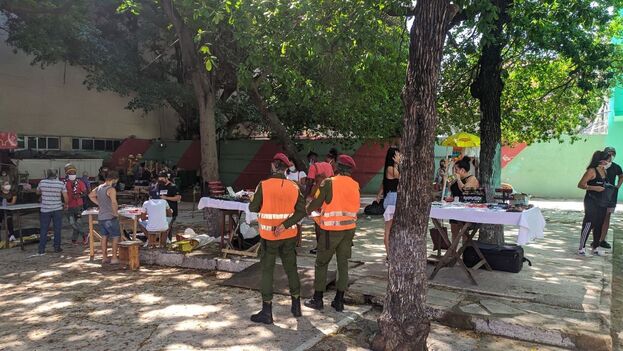
During the last weeks, due to the restrictions imposed in the country by the pandemic, stores were not selling any products that weren’t necessary for basic household cleaning and food. So there is a lot of accumulated need for clothes, shoes, household supplies and hardware.
The bureaucracy, meanwhile, takes its time. On Friday, in the office of the Directorate of Identification, Immigration and Foreigners located on Calle 17 in Havana’s El Vedado neighborhood, the receptionist only shooed away the flies and answered the questions of those who arrived.
“We have not yet begun to carry out procedures, but come on Monday and we may already be open for the preparation of passports,” the employee repeated. With more than three months of the border being closed and the failure to issue these travel documents, many frequent travelers express their despair.
“They have given extensions to the time one is allowed to be outside of Cuba [without losing the right to return], a moratorium on paying for self-employment licenses, but it has not occurred to them to extend the expiration date of the passports,” Rebeca, a resident of the capital whose passport expired in April, told this newspaper.
“I have lost months without being able to leave and now I have to renew my passport as if everything had been normal in this time,” added Rebeca. “That is not right, because the same government that reviews the document at the airport so that I can leave the country knows that it has been months that people cannot renew or get a passport.” Cuba’s is the most expensive passport in the world in relation to purchasing power: it costs 100 CUC (roughly three month’s salary), with two extensions allowed at 20 CUC each. for a term of six years.
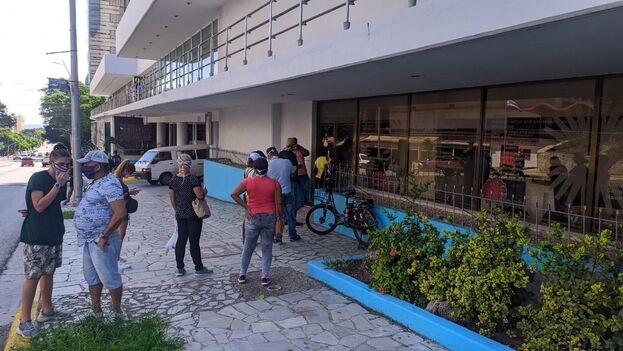
In the nearby Cubatur office the Friday countdown to the reopening generated a line to buy tour packages. In the basement of the emblematic Habana Libre hotel, a dozen people waited for the offers of accommodation in the provinces, where the residents of the capital could not go until now.
“I can’t take it anymore, I have to take a few days somewhere even if it’s two stars,” commented a woman who identified herself as an employee of a foreign firm that has “been out of work for three months and with the future horizon in gray with black stitching.”
“I know it is time to save every penny, but right now I need to be with my family in a place where I don’t have to stand in line for food, find a way to make do in the kitchen, or have someone knock on my door every day to track the pandemic. I’m going to the worst hotel, as long as it’s not my home.”
___________
The 14ymedio team is committed to practicing serious journalism that reflects Cuba’s reality in all its depth. Thank you for joining us on this long journey. We invite you to continue supporting us by becoming a member of 14ymedio now. Together we can continue transforming journalism in Cuba.
